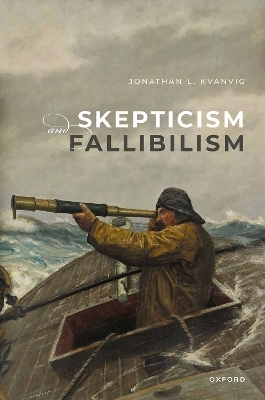
Skepticism and Fallibilism
Seiten
2024
Oxford University Press (Verlag)
978-0-19-892479-1 (ISBN)
Oxford University Press (Verlag)
978-0-19-892479-1 (ISBN)
- Noch nicht erschienen (ca. Dezember 2024)
- Versandkostenfrei innerhalb Deutschlands
- Auch auf Rechnung
- Verfügbarkeit in der Filiale vor Ort prüfen
- Artikel merken
There are two common responses to skepticism, the claim that knowledge is non-existent and perhaps also unachievable: to succumb to it, or to dismiss it. Kvanvig shows how to avoid these responses by offering a theoretical development of skepticism, and arguing that epistemic reasoning may nevertheless approximate to the skeptical ideal.
There are two common responses to skepticism, the epistemological claim that knowledge is at least non-existent and perhaps also unachievable, and both are to be avoided. So Jonathan Kvanvig argues here. The first response is to succumb to it, trying then to find some adequate basis for life that foregoes presumptions of knowledge. The second response is dismissive, viewing it as an overwrought, hyperbolic response to human limitations, so wrongheaded that nothing beyond a laconic response is needed before returning to important philosophical tasks. Avoiding these responses requires theory development on the part of skepticism and a way of characterizing sensitive fallibilism in contrast to complacent versions of it. These two tasks take up the majority of the chapters, several of which show how theory development on behalf of the skeptic needs to proceed. The hardest part of this project is to characterize the skeptical ideal for matters that we investigate through the use of defeasible reasoning, where the idea of finding an infallibilist standard looks impossible. In spite of this appearance, it is possible to characterize this ideal in terms of reasoning that puts one in full control over the possibility of error. The other task involves characterizing fallibilism in terms of this notion of full control over the possibilities of error, and then developing a version of this view that doesn't require such full control while at the same time acknowledging, predicting, and explaining how and why such full control appears whenever the language of knowledge is used. The result is an approximationist version of fallibilism that acknowledges that our knowledge is never ideal but is nonetheless close enough to the ideal to be present.
There are two common responses to skepticism, the epistemological claim that knowledge is at least non-existent and perhaps also unachievable, and both are to be avoided. So Jonathan Kvanvig argues here. The first response is to succumb to it, trying then to find some adequate basis for life that foregoes presumptions of knowledge. The second response is dismissive, viewing it as an overwrought, hyperbolic response to human limitations, so wrongheaded that nothing beyond a laconic response is needed before returning to important philosophical tasks. Avoiding these responses requires theory development on the part of skepticism and a way of characterizing sensitive fallibilism in contrast to complacent versions of it. These two tasks take up the majority of the chapters, several of which show how theory development on behalf of the skeptic needs to proceed. The hardest part of this project is to characterize the skeptical ideal for matters that we investigate through the use of defeasible reasoning, where the idea of finding an infallibilist standard looks impossible. In spite of this appearance, it is possible to characterize this ideal in terms of reasoning that puts one in full control over the possibility of error. The other task involves characterizing fallibilism in terms of this notion of full control over the possibilities of error, and then developing a version of this view that doesn't require such full control while at the same time acknowledging, predicting, and explaining how and why such full control appears whenever the language of knowledge is used. The result is an approximationist version of fallibilism that acknowledges that our knowledge is never ideal but is nonetheless close enough to the ideal to be present.
Jonathan L. Kvanvig is Professor of Philosophy at Washington University in St. Louis, formerly Distinguished Professor of Philosophy at Baylor University, and having held previous faculty positions at the University of Notre Dame, Texas A&M University, and the University of Missouri. His scholarly activities focus in metaphysics and epistemology, philosophy of language and logic, and philosophy of religion, including the publication of 18 books and more than 130 articles. He is the founding editor of Oxford Studies in the Philosophy of Religion and has received grants from the NEH, the John Templeton Foundation, and the Templeton Religion Trust.
| Erscheint lt. Verlag | 26.12.2024 |
|---|---|
| Zusatzinfo | None |
| Verlagsort | Oxford |
| Sprache | englisch |
| Maße | 156 x 234 mm |
| Themenwelt | Geisteswissenschaften ► Philosophie ► Erkenntnistheorie / Wissenschaftstheorie |
| Geisteswissenschaften ► Philosophie ► Geschichte der Philosophie | |
| Geisteswissenschaften ► Philosophie ► Philosophie der Neuzeit | |
| ISBN-10 | 0-19-892479-8 / 0198924798 |
| ISBN-13 | 978-0-19-892479-1 / 9780198924791 |
| Zustand | Neuware |
| Informationen gemäß Produktsicherheitsverordnung (GPSR) | |
| Haben Sie eine Frage zum Produkt? |
Mehr entdecken
aus dem Bereich
aus dem Bereich
die Grundlegung der modernen Philosophie
Buch | Softcover (2023)
C.H.Beck (Verlag)
18,00 €
Buch | Softcover (2023)
Reclam, Philipp (Verlag)
7,00 €

![Was heißt Denken?. Vorlesung Wintersemester 1951/52. [Was bedeutet das alles?] - Martin Heidegger](/media/113619842)
